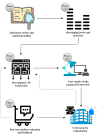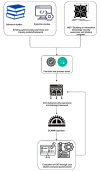Cybersecurity Awareness and Training (CAT) Framework for Remote Working Employees
- PMID: 36433259
- PMCID: PMC9695971
- DOI: 10.3390/s22228663
Cybersecurity Awareness and Training (CAT) Framework for Remote Working Employees
Abstract
Currently, cybersecurity plays an essential role in computing and information technology due to its direct effect on organizations' critical assets and information. Cybersecurity is applied using integrity, availability, and confidentiality to protect organizational assets and information from various malicious attacks and vulnerabilities. The COVID-19 pandemic has generated different cybersecurity issues and challenges for businesses as employees have become accustomed to working from home. Firms are speeding up their digital transformation, making cybersecurity the current main concern. For software and hardware systems protection, organizations tend to spend an excessive amount of money procuring intrusion detection systems, antivirus software, antispyware software, and encryption mechanisms. However, these solutions are not enough, and organizations continue to suffer security risks due to the escalating list of security vulnerabilities during the COVID-19 pandemic. There is a thriving need to provide a cybersecurity awareness and training framework for remote working employees. The main objective of this research is to propose a CAT framework for cybersecurity awareness and training that will help organizations to evaluate and measure their employees' capability in the cybersecurity domain. The proposed CAT framework will assist different organizations in effectively and efficiently managing security-related issues and challenges to protect their assets and critical information. The developed CAT framework consists of three key levels and twenty-five core practices. Case studies are conducted to evaluate the usefulness of the CAT framework in cybersecurity-based organizational settings in a real-world environment. The case studies' results showed that the proposed CAT framework can identify employees' capability levels and help train them to effectively overcome the cybersecurity issues and challenges faced by the organizations.
Keywords: COVID-19; artificial intelligence; cybersecurity; cybersecurity awareness; education; training framework.
Conflict of interest statement
The authors declare no conflict of interest.
Figures
Similar articles
-
AI-driven cybersecurity framework for software development based on the ANN-ISM paradigm.Sci Rep. 2025 Apr 18;15(1):13423. doi: 10.1038/s41598-025-97204-y. Sci Rep. 2025. PMID: 40251237 Free PMC article.
-
Digital Transformation and Cybersecurity Challenges for Businesses Resilience: Issues and Recommendations.Sensors (Basel). 2023 Jul 25;23(15):6666. doi: 10.3390/s23156666. Sensors (Basel). 2023. PMID: 37571451 Free PMC article. Review.
-
We need to aim at the top: Factors associated with cybersecurity awareness of cyber and information security decision-makers.PLoS One. 2024 Oct 18;19(10):e0312266. doi: 10.1371/journal.pone.0312266. eCollection 2024. PLoS One. 2024. PMID: 39423170 Free PMC article.
-
Health Care Cybersecurity Challenges and Solutions Under the Climate of COVID-19: Scoping Review.J Med Internet Res. 2021 Apr 20;23(4):e21747. doi: 10.2196/21747. J Med Internet Res. 2021. PMID: 33764885 Free PMC article.
-
Usability and Feasibility Evaluation of a Web-Based and Offline Cybersecurity Resource for Health Care Organizations (The Essentials of Cybersecurity in Health Care Organizations Framework Resource): Mixed Methods Study.JMIR Form Res. 2024 Apr 11;8:e50968. doi: 10.2196/50968. JMIR Form Res. 2024. PMID: 38603777 Free PMC article.
References
-
- Kemmerer R.A. Cybersecurity; Proceedings of the 25th International Conference on Software Engineering; Portland, OR, USA. 3–10 May 2003; pp. 705–715. - DOI
-
- Khan F., Zahid M., Gürüler H., Tarımer İ., Whangbo T. An Efficient and Reliable Multicasting for Smart Cities. Comput. Mater. Contin. 2022;72:663–678. doi: 10.32604/cmc.2022.022934. - DOI
-
- Impact of COVID-19 on Cybersecurity. Deloitte Switzerland. [(accessed on 3 April 2021)]. Available online: https://www2.deloitte.com/ch/en/pages/risk/articles/impact-covid-cyberse....
-
- Sabillon R., Serra-Ruiz J., Cavaller V. An effective cybersecurity training model to support an organizational awareness program: The Cybersecurity Awareness TRAining Model (CATRAM). A Case Study in Canada. J. Cases Inf. Technol. JCIT. 2019;21:26–39. doi: 10.4018/JCIT.2019070102. - DOI
MeSH terms
LinkOut - more resources
Full Text Sources
Medical
Miscellaneous




